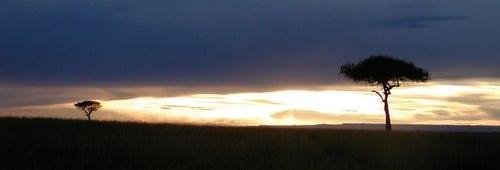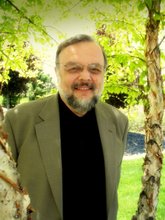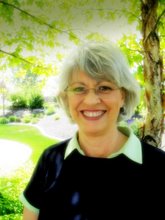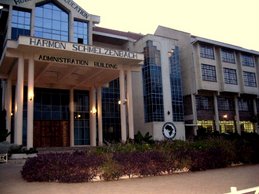John Yual
John Yual was born in 1973 in Southeast Sudan near the Ethiopian boarder among the Nuer tribe. He and his brother and sister were raised by their mother after the early death of their father. John was not allowed to attend school because, at the time, education in Sudan was reserved for Muslims. His family sent him to Ethiopia to protect him from the Sudanese army. There he connected with the Church of the Nazarene. After working as a trainer and church planter, he has been appointed as district s for Sudan, shepherding over a thousand pastors across nearly a million square miles. An early European writer, travelling in the Sudan, called the men of the South Sudan the "natural gentlemen of Africa." This seems a good description of John: tall, intelligent but soft-spoken, communicating a quiet wisdom. In May of 2008 he received his bachelor of theology degree from Africa Nazarene University. At the age of 15, John’s uncle Gatkuoth Toang shared from the Bible with him.
“He told me about the gift of life through Jesus Christ, that Jesus died for my sins, and that when I give my life to Him He will liberate me from being a slave to idol worship. I was amazed at the fact that somebody died for me, and so I tried to know much about the reasons why.”
In 1989, when John was sixteen, life changed dramatically for him.
“I was in a cattle camp, and when the troops came they said they attacked our village because there was a rebel. So the Sudan army came at night to attack the place, and one of them said it is better for you young guy to run for your life, don’t be here. In Sudan there are some places where one can only travel at night and not by day for security reasons. The place I was living was not very far from the border of Ethiopia, and I managed to cross to the other side within three days. I was with my friends--a group of young men--and we carried some cattle with the idea that when we reached Ethiopia we could sell the cows and find money to survive.
John ended up in a refugee camp, and though life there was extremely hard, it was there that he was able to receive schooling and learn to read for the first time.
Another turning point happened for John in 1995 when a group of Sudanese friends told him about a new church in Addis that had English services. Since he was interested in learning English, John started attending the Church of the Nazarene. What captured his thinking was the doctrine of holiness. At first it brought multiple questions.
“Does it mean other churches are not holy? In Ethiopia there is the Orthodox Church, and they call themselves the most holy people, and this other holiness I am hearing, is it the same or there is a difference? These were my questions. Finally, I got the message that it is not just an outside adornment but an inner transformation that is revealed outside.”
John joined the Church of the Nazarene in Addis Ababa and began working with the youth. Gradually he was given more responsibility. Although he did not see himself as a minister, when the other pastors at the church immigrated to the United States and Canada, John experienced the grace of God giving him more interest in ministering.
“My first time to attend district assembly, some church leaders met with us and said we want a person who will train pastors in Ethiopia and some day go to Sudan and start the church. I said, ‘OK, I don’t have a person like that in mind.’ We took a course, and the leaders say they checked the criteria of who will be fit for this job and decided it would be me. They ask me if I would be willing to train pastors, and I say, ‘If it is the plan of God.’ They ask me, ‘What is your priority while you are in the refugee camp?’ and I tell them, ‘To go to America or Australia or anywhere in the world because the life in the camp is terrible.’ I prayed and decided to train pastors, but at the same time my wife’s uncle sent us visas to go to Australia. I say, OK, this visa I was wanting for many years is here . . . what is going on? I prayed about it, shared with my wife, and we say we will go ahead and train pastors. People in the camp say, ‘Are you out of your mind?’
“In 2003, during the regional conference in South Africa, I was sharing with my field director that in Sudan we do not have a church there. So I asked him, ‘What about we start a church there?’ He said that it was a good idea, but the question was how can we go there? There was no transport, no means of communication, no security . . . how can we go there? He suggested that we can wait until peace prevails, then we can go. I said, ‘Peace may come any time, but our people need Jesus before peace.’ He said, ‘Ok, I cannot stop you.’ After we had finished our course it was February 2003, and by March 2003 I was on my way to Sudan. I went to one of the towns, Gambella, which is on the border, and waited for some people who could walk with me. One could not walk alone because it was insecure. You must be accompanied by people who have their own guns for protection. I found some fifteen young guys who came from Sudan for trade. After talking to them they said it was OK, I can join them, and we went. We had to walk for seven days before we reached the Sudan border. There were robbers who would organize themselves to disturb the border so you could not cross any border without seeing trouble. Even the local tribes were fighting each other because of Arabic influence, and there was no government at all. On our way we found more than twenty people killed who had been walking ahead of us.
“In my mind I said . . ., ‘OK, the church is not here, how can I start it?’ I said to myself that I must start it by teaching. I called some guys under the tree to talk to them if they were willing to listen to me. I talked to them about what the Bible says they need to do and whether they could accept God.”
For one-and-a-half months he traveled the countryside, teaching beneath a tree to whomever would listen. In that time he started thirteen churches. That was 2003, and later on in October of that same year thirty more churches were planted.
“When peace came we were already there. That is how the church came to existence in Sudan.”
Though today there are more than a thousand Nazarene churches in Sudan, there continue to be challenges with developing and communicating with leaders in the field.
“Even today in Sudan there is no good communication, especially in southern Sudan where I have been for ministry. Most of my churches in south Sudan I cannot reach them using my car; I must walk with my leaders to visit the churches there. I think God’s grace is how come, without communication, the church is growing. It is something that I myself . . . cannot understand; it is God’s grace that makes all those things to happen. I get letters saying, ‘We have started a church here,’ but I did not know this people, they said that they heard about the Church of the Nazarene so they decided to start one there. They invite me to go, so I send some pastors and my assistant to go and see those places and organize and teach them. What I can say is that it is the grace of God all this happening.
“The only thing you do as a church planter or an evangelist is to pray, ‘God, if I meet three people, show me one . . . someone who can really buy this vision. If I find ten, give me two.’ Because of this prayer He gives me people, and even when there are many He helps me to identify one. When you want to plant a church you do not ask for qualified leaders, you just ask for people who are willing to serve God. And when you talk to someone, the Holy Spirit will help you to know that this one is real, genuine, and this other one is not serious. The Holy Spirit gives you discernment to know who is who.”
As district superintendent of three districts in a country that is nearly one million square miles, John has a major challenge communicating with the one thousand pastors he shepherds. However, through the use of strategically placed satellite phones, John can call the pastor with the phone who will then send out letters to the other pastors to gather for a pre-arranged call. It takes some pastors two days to walk to the gathering, but the call from John serves as an encouragement and a planning tool for the pastors.
John was asked to share his insights on the following topics:
· About holiness: “When we came for the first time in Sudan we started the message of holiness. They actually didn’t just want to know about holiness, but they also wanted to join the Church of the Nazarene. In Sudan we have been going through difficult times because of civil war, and so people need love. When they see you showing love and living a life of love they get encouraged and are attracted to know what is happening there. I think people are interested in those who walk the talk. In Sudan our problem is peace, peace between neighbors. We need a solution where believers can live in peace with our Muslim neighbors. When they see us living in peace, love, and unity then what we preach is able to make sense to them. We don’t preach hatred against the Arabs. To win Muslims we need to spend time, develop a friendship, show love and care, then once we have a good relationship with them, they will want to know more about the gospel.”
· About Africa: “Before coming to Africa Nazarene University, when I thought of Africa I thought of my country only. Now, even if I am doing well in my country, I know that there is more that needs to be done in Africa, in the entire church, and for the sake of the Kingdom.”
· About contextualizing the gospel and church organization: “If we go through the Church of the Nazarene manual, there are parts that do not make sense to Africans. An example is the issue of associate members. In my community you cannot tell people that you are a full member and the other is an associate member in the church. That says to the associate member that ‘we do not need you here.’ We need to remove that part of the manual and differentiate between leadership and membership.”
· About how the global church can pray: In the last twenty years conflicts in Sudan have resulted in more than four million people being displaced and two million deaths. A peace agreement signed in January 2005 gave southern Sudan autonomy for six years, which has resulted in an uneasy truce.
“If war comes, where will our church be during that time? What will be the future of our church if another war breaks out in Sudan? This is the first priority that we need prayer for our people, that God may bring peace because He is the only one who can bring the peace that we need in Suda























